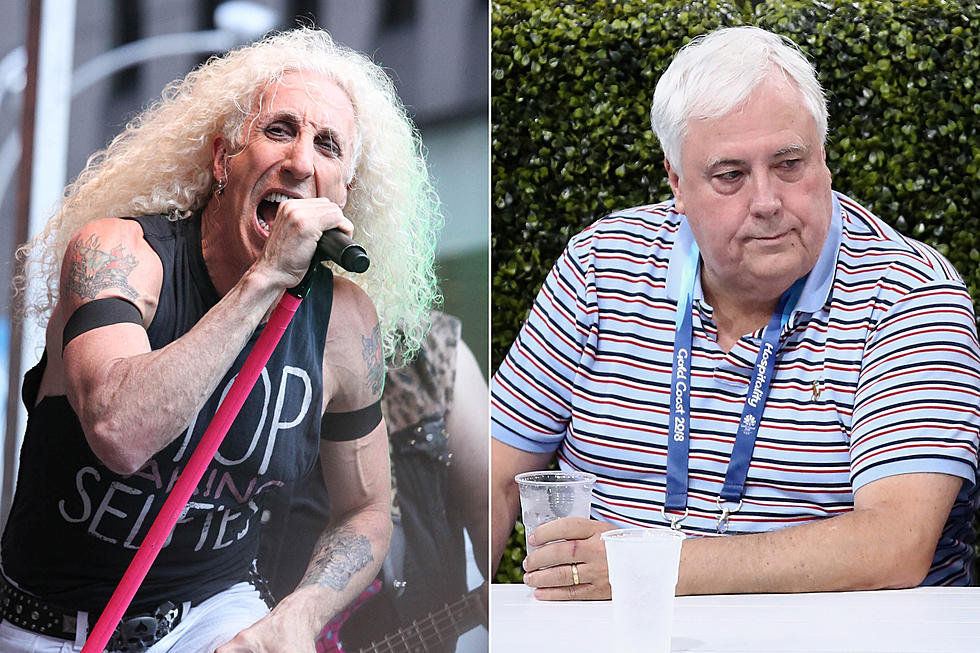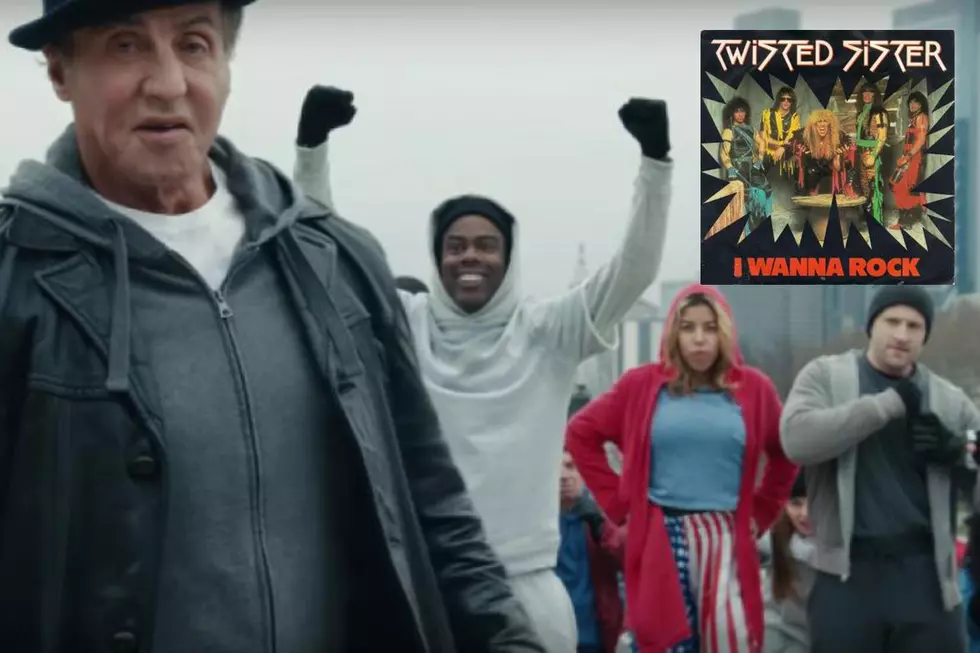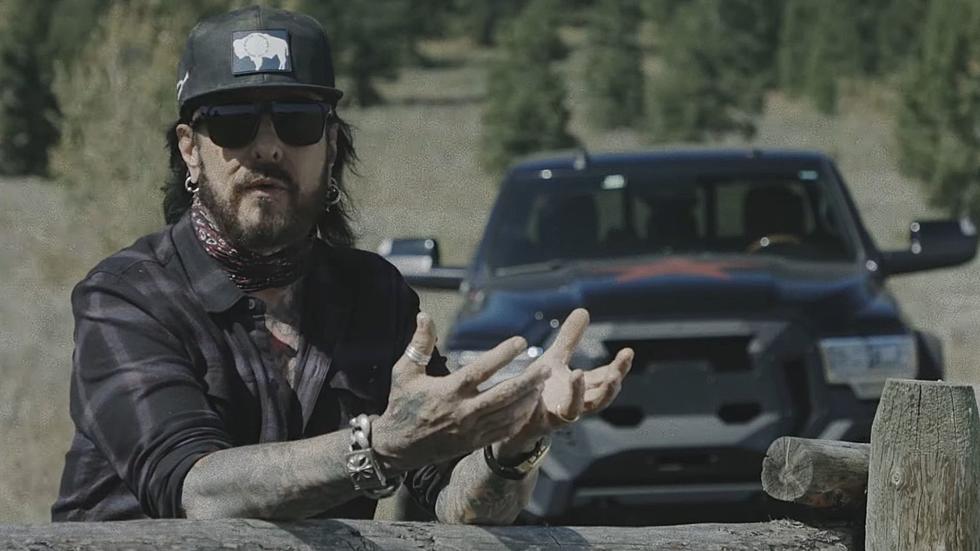
Twisted Sister’s Dee Snider Talks Loss of A.J. Pero and Why Lemmy Kilmister Was a Real-Life Angel
In Part 2 of our interview with Twisted Sister frontman Dee Snider, he discusses the loss of two of rock 'n' roll legends. First, he addresses the death of Twisted Sister drummer A.J. Pero and why Mike Portnoy was tapped as his replacement on the band's final tour. Moving on from Pero, Dee lamented the crushing passing of Motorhead's Lemmy Kilmister, who helped Twisted Sister at some of the most critical moments during their career. After reading Part 2 of our interview, check out Part 1, where the bleached-blond wildman goes in depth about the We Are Twisted F***ing Sister! documentary, which is out on DVD/Blu-Ray, VOD and digital download now and in theaters at these locations.
You've been adamant that Twisted Sister only exists as Jay Jay French, Eddie Ojeda, Mark Mendoza, A.J. Pero and yourself. There's a distinct work ethic that exists among that collective. Mike Portnoy's career speaks to these values and he's a New York native. Is this why he was tapped as Pero's replacement for the last tour?
My exact quotes, I've talked often about bands reuniting and how it's bullshit when it's not the original members. My post was 'unless you're dead you need to show up for the reunion.' So, A.J. is excused. I've often said unless you're dead. I've been wanting to end it on a positive note. I love the guys, they're my friends and that's how I want to end this thing. I've got a lot of different things going on and I don't want to be in Twisted Sister forever. I have and have always had an expectation of a Twisted Sister show and one of those may be makeup and costumes. That went out the window so at the least the performance level needs to be there and it's something that I'm not sure I can always do forever - the performance at that level and intensity.
With A.J. passing, the band said, you know, leaving, he's gone. This is a time to end, but A.J.'s estate was in a terrible place and I was doing some shows that allowed his family to get some money — much needed. We said, let's do some shows and deciding who to pick, interestingly, we had had discussions prior to A.J.'s passing because we play so infrequently and the income from these shows is important to people. Well what happens if someone gets sick? You're doing 20 shows and somebody can't make a show? Do you cancel?
The decision was no, we'll each pick a replacement person. So that the show can go on and people can get paid. It sounds kind of, I don't know, greedy or selfish, but it's practical. Everybody picked somebody and A.J. picked Mike Portnoy. Then A.J. died, so there was this odd thing that he picked his own guy. Mike was A.J.'s choice, we asked Mike to do it and he said he would be honored and it was great. He's incredibly classy and respectful to A.J.'s playing style. He's not trying to be Mike Portnoy. We would project A.J.'s drum solo and one night the projector broke, we asked him if he wanted to do a drum solo he said absolutely not, it's not about me. It's about respecting A.J. and I'd rather not do a solo.
I know people beat Mike up for being a little egotistical or whatever people say, but he's been nothing but an amazing guy and an amazing gentleman. The most class act you can possibly ask for in this situation.
What was your favorite quality about A.J.?
A.J.'s the one that I continued to have a connection to the entire time the band was broken up. Jay Jay French said we lost the nice one [laughs]. He was the nice one. He was the nicest guy in the band. People loved him. I miss that, I miss his stupid smile. He was also called ‘The Oracle.’ He was so knowledgeable in music, specifically our music. He knew all music but our music — any time there was, especially when we were reunited, and we were trying to remember how we did something or an arrangement. A.J.? Ask The Oracle, and he would remember.
Jay Jay has been the manager ever since the band started, pretty much. So it's all been pretty in-house, when you're handling everything in-house it can get tricky, tensions can run high. It seems like A.J. was always the one that smoothed over any tensions and brought some light heartedness to the band.
He never gets credit for reuniting the band but he really deserves credit, because when the band broke up, we broke up for 15 years, he remained in touch with every guy. So he was the one person who still had connections to everybody in the band and through him we were all still connected. That really was the first, the fact that he kept those conversations going — he kept that alive. That there was one person that everybody, and again, the nice one! There was one person that everyone was like, I hate all of them, but I like A.J. So I like A.J. too. We all liked A.J. and hated everybody else. You can build off of that and we did. Yeah, it was 9/11 and it was the New York Steel Show. There's some footage of us reuniting I think someplace out there. But A.J. was at the center of all of that.
I know you were personally close with Lemmy Kilmister and it comes up three to four times in the documentary. Lemmy had a close connection to Twisted Sister from introducing you at the Wrexham Festival and making other appearances. You've said when you need a little bit of a jolt onstage, you had a surprise in your back pocket - you brought Lemmy up there. Where were you when you learned of his passing?
Where was I? It's funny, I said I would always remember where I was when he passed and now I'm not remembering where I was. I've been traveling so f--king much... I can't tell you where I was but I can tell you it was John Lennon level of moved in how it's affected me. I talk about it on my podcast at length -- I broke down on that thing. I don't break down. He was that guy and my wife, she knew Lemmy and met him a bunch of times and knew how important he was.
We went to his memorial and all these people, and this is the big realization for me, is that it wasn't just me. Not that I'm so egotistical to think that, but Lemmy was a great guy to so many bands and touched so many musicians and inspired so many people. Not just musicians, but regular Joes and Janes. I don't know if you got to see the memorial, but the range of people that got up to speak was Dave Grohl, Slash, Lars Ulrich to his shoemaker and his drinking buddy. They were all — and his crew and he was just this great guy.
My wife said to me, my wife is not religious but spiritual, and she said I think he might have been an angel. I said, 'What are you talking about?' She said, 'They say that there are angels, people who are here and they're purpose is to guide us and help us in our own journey. I think Lemmy might have been one of them.' At first, I said wouldn't that be f--king God's irony, to send down an angel, hard drinking, hard drugging, hard rocking f--king pirate and a half, but everything you hear about him in these stories just blow you away.
Here he was at a time in our career, we needed a guide. We had gotten as far as to get over to England and get that Secret [record label] record deal, but now that deal fell apart. We had all of these things and there was no hair metal, no Motley [Crue] or Ratt. Bands with makeup were not being heralded in the rock scene. They were being thrown cans and bottles on stage. Lemmy shows up and just is there, he's showing up at every show! Walking out on stage or out in the audience or introducing the band. Every critical moment at that critical time, he is there to carry us through and he really did. Then he gets us to the finish line, I still saw him and knew him, but his work was done. Then he moved on to some place else. I don't know. If you believe in those kinds of things, he might have been.
Lemmy was the epitome of rock 'n' roll. Motorhead and Twisted Sister as far as looks go, you can't get much more of a dichotomy there. Twisted Sister, just like Motorhead, you truly embody the spirit of rock and roll and that comes through a lot in the documentary too, which is something I don't think a lot of people realize. They knew the two hits, hopefully more, but what the documentary really showcases is how much of a spirit of rock 'n' roll that you have and it feels like that was definitely the connection you had with Motorhead.
Yeah. Lemmy, he saw the rock band that was at its core. It's one of the best kept secrets in rock ‘n’ roll, that Twisted Sister is one of the greatest live bands, and most assertive and assaultive and aggressive and intense bands out there and Lemmy saw that and he just - he said to me, years ago, and I wear this as a badge, he said I'm one of the three greatest frontmen he's ever seen on a stage and the greatest he's ever seen talk to the audience. This is the guy that saw the Beatles at the Cavern Club and the [Rolling] Stones at the Marquee and roadied for Jimi Hendrix, so he's been around [laughs]. To get that kind of accolades and yes, Twisted Sister in a world, touring wise, it wasn't that big of a window and we didn't do it that thoroughly, that we established ourselves for what we do best, killing it live — which is what I do best.
I'm doing a lot of other things now, but as a frontman it's the thing I've done the greatest at in my life and I'm best at. Lemmy recognized that and championed it and pushed others to see it. By turning a blind eye to how we looked, [laughs] he got his audience to look beyond it. That's what they were doing — they were putting up with it! They were putting up with the makeup and costumes for the great rock.
Thanks to Dee Snider for the interview. Don't forget to read the first part of our interview where Dee discusses the 'We Are Twisted F***ing Sister! documentary and the decade the band spent playing bars. Again, 'We Are Twisted F***ing Sister' is out on DVD and digitally on Feb. 23.
Watch a Trailer for 'We Are Twisted F***ing Sister'
See Where Dee Snider Ranks Among the Top 50 Hard Rock + Metal Frontmen of All Time
See Dee Snider in 13 Kings of Stage Banter
More From 98.3 The Snake










